Jamie Cullum, Ala.Ni and Steve Coleman crown captivating Montreal jazz mass
Thursday, July 28, 2016
Jazzwise went for another midweek hit at the behemoth Montreal Jazz Festival this year, Monday 4 July (escaping Stateside anti-colonial explosions) thru 7 Thursday.
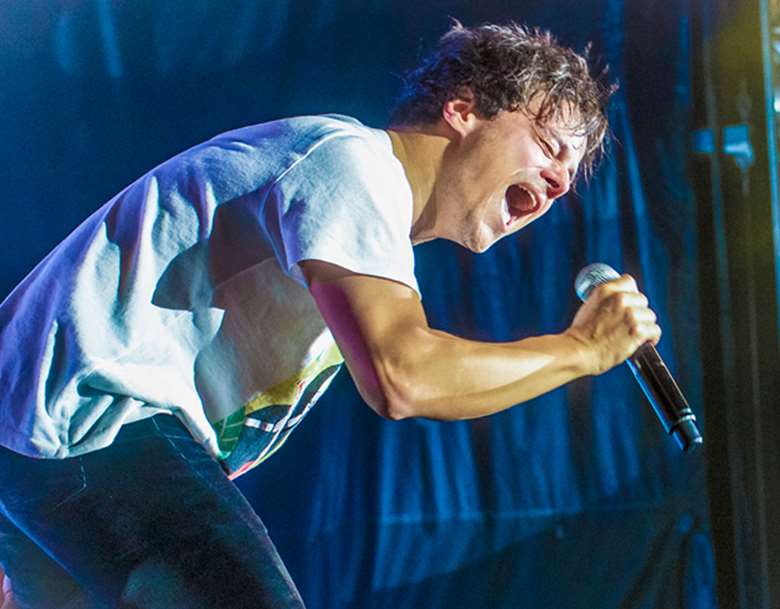
Fireworks for the 4th were provided by Jamie Cullum on a return engagement after igniting Maison Symphonique with his Montreal staffed big band in 2015. Tom Richards’ volatile charts were reprised from that concert but blew with extra fire the second time around in front of an even bigger crowd atop the massive TD stage in the Place Des Festivals. Cullum’s loose cannon stage energy chivvied his pick-up orchestra yet again, yielding more than contractual professionalism.
The diminutive boy wonder from Essex, though now 36, joked at his own expense that many in the audience probably thought he was 12, adding cracks about his taller Canadian born rivals Michael Bublé and Justin Bieber. Cullum whooped support for local soloists saxist Jean-Pierre Zanella, trumpeter and band wrangler Ron Di Lauro, brilliant local ringer Andre Leroux on clarinet plus raunchy bass trombonist Robert Ellis – then hyped up baritone saxist Jean Frechette (nice for a bari player, lonely grunt at the end of the section, to get hyped) for the Mingus lifted intro to the title track from his platinum-selling second CD Twenty Something (Universal 2003).
Ever eager to hurl spanners or fresh friends in the works, Cullum asked up Quebec hip hop emcee Jai Nitai Lotus to help reprise the update of ‘Love for Sale’ that appeared on Momentum (Island, 2013) with guest rapper Roots Manuva. That effort was originally produced by US hip hop producer Dan the Automator and its grungy processed beats left the Montreal big band rather redundant. The irony is that Cullum’s efforts to rehash standards (understandable set-list stuffers at a jazz festival) are so much less effective than his restless originals, which, along with those co-written with big brother Ben, heavily populate Momentum, including the raucous dystopian freakout ‘The Same Things’ that kicked off this night’s big gig. He’d have been better off encoring solo with ‘Get A Hold of Yourself’ than ‘What A Diff’rence A Day Made’ which rendered bathos, but the latter was his way of celebrating the day, the moment and he’s all about that. However, he’s also much cleverer than Bublé or Bieber and keeping a toe stuck in the old armoire of standard repertoire can sometimes hold him back.
The previous night Cullum, a BBC Radio 2 presenter and significant talent scout, had introduced three more acts from the UK. This was a standout showcase at L’Astral at last year’s fest but, yet again, the Beeb left it late to announce this event, so it did not appear in the official programme, which is selling these artists short.
Another Brit, somewhat pickled in amber at this point, Burton-on-Trent’s Joe Jackson, played Theatre Maissonneuve prior to Cullum. Sympathising with Jackson in my youth, sensing he was jazzy (even though his most jazzy looking albums often surprised or disappointed with something else, like the dub-reggae and ska not quite promised on the jumpin’ jive album cover art of 1980’s Beat Crazy or the Blue Note spoof of Body and Soul, 1997), this encounter reminded what a capable pianist he is. A life-long Ellington and Gershwin fan, who occasionally played with the National Youth Jazz Orchestra, Jackson held equal affection for Beethoven, studied at the Royal Academy of Music and has resisted pigeonholing throughout his career. His 2015 offering Fast Forward is choc-a-bloc with hindsight, cynicism and self-deprecation with some passing jazziness, in a Steely Dan-meets-Supertramp manner. There were no horns at Maissonneuve however and Jackson came on alone for several songs including a cover, complete with ‘Blue Monk’ quote, of Joni Mitchell’s ‘Big Yellow Taxi.’ With its, yes more, dystopian lyrics – every Englishman since Sir Thomas More has scoffed at the concept of utopia – this was a natural fit for Jackson and he impressively approximated Mitchell’s falsetto during his boogie-woogie version.
Prior to the heart-on-sleeve Brits, Taylor McFerrin infused L’Astral with a more oblique and evanescent vibe in cahoots with drummer Marcus Gilmore. Both progeny of famous fathers (Taylor’s is vocal genius Bobby McFerrin, Gilmore the son of bebop drum legend Roy Haynes), each downplayed that dynastic tie, intent on confecting a down-tempo ambient swirl, Gilmore with skittery breakbeats, McFerrin with swathes unfurled from Prophet-6 synth, sampler and Fender Rhodes in synch with mellifluously inferred vocals.
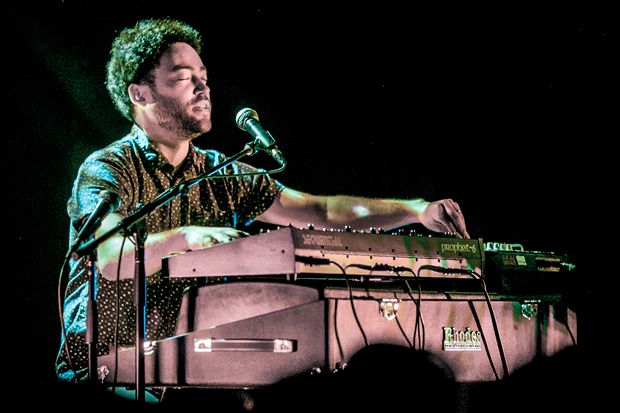
The first gig of the evening had been the second instalment of Kenny Barron’s Invitation Series residency at the cloistered Gesu, alongside recent Manhattan School graduate, and fabulously-named flautist, Elena Pinderhughes. The softly spoken pianist, who I chatted with in the hotel hallway since he was rooming next to me in the Hyatt, chose intimate contexts – a duo with guitarist Lionel Loueke the night before and his trio with Jonathan Blake and Kiyoshi Kitagowa backing flute. Pinderhughes, who I’d last caught as an under-utilised sidekick with Stefon Harris, backed up her up-and-comer hype without fanfare proving rhythmically bold and succinct. Like Esperanza Spalding or Grace Kelly, she’s a double threat with a pretty voice, singing Janis Garett’s idyllic lyrics to Barron’s ‘Cook’s Bay’ commemorating his 54th wedding anniversary in Tahiti. ‘A waterfall making a canopy of rainbows’, as the words describe, defied cuteness thanks to Barron’s gorgeous, shimmering flow at the keys and the perfectly counterweighted contrabass. After a fast bop workout and another Jarrett penned lyric to ‘The Question Is…’ Barron revisited one of his simple, gorgeous perennials, ‘Sun Shower’, and finished the set with a slow blues dripping with feeling. The latter threatened to leave the 20-year-old Pinderhughes, who will release her debut record next spring, somewhat lacking, but she delivered, conjuring the feel of David Newman with added first instrument prowess.
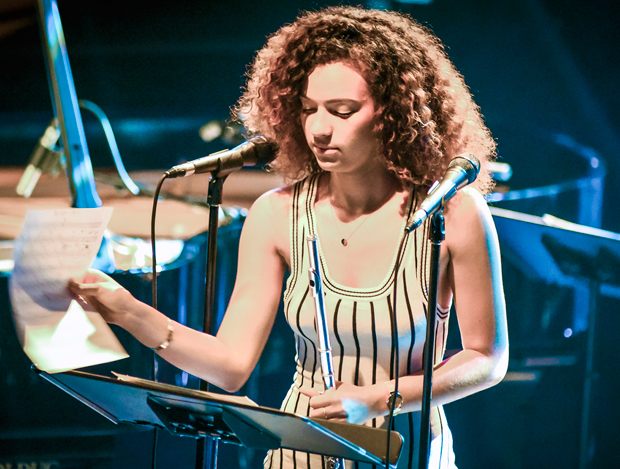
Another young performer with impressive curly hair, and reputation preceding, opened my Tuesday experience at Club Soda. Sydney born, 29-year-old electric bassist Tal Wilkenfeld already has an incredible resume backing the likes of Herbie Hancock, The Allman Brothers, Jeff Beck, Chick Corea and Wayne Krantz. By all accounts, she was ready for action straight out the egg, quitting high school and moving to LA and then NYC, playing with everybody, via sitting in and proactively sending out tapes, which included a landmark recorded appearance at Eric Clapton’s Crossroads Guitar Festival in Chicago in 2007. Wilkenfeld recorded her debut album Transformation the year before with Geof Keezer, Seamus Blake and Krantz but has been so in demand as a sessioneer since that only recently did she start to step out as a leader in her own right, currently opening for The Who with her own group.
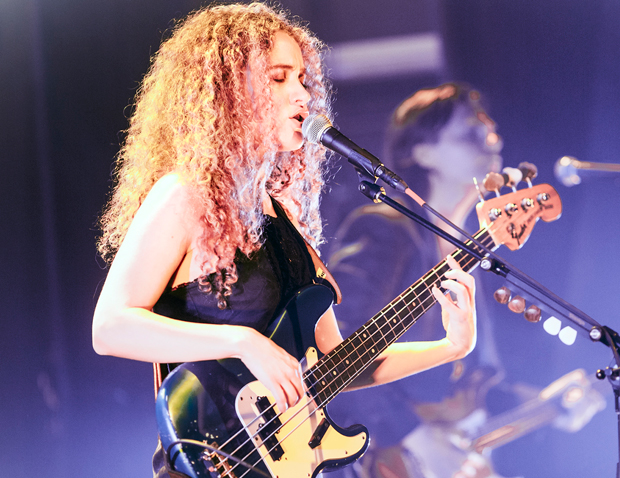
Though originally a guitarist Wilkenfeld is a natural bassist, intuitively cherry dropping notes in apposite spaces however busy the music. Her clean but rubbery articulation, astute timing and warm tone on both Harmony H-22 and Fender Precision inevitably recalled Jaco Pastorius (despite the presence of frets), but her lyrics to ‘Corner Painter’ conveyed a darker message beyond her instrumental prowess. Incessant touring and recording with the above names has to have compromised Wilkenfeld’s personal life and ‘Corner Painter’ – about a lover who has painted himself into a corner already with a prior relationship and is only available for ‘on and off’ time with her – conveys real world poignancy. Given Wilkenfeld’s gung-ho attitude from a young age her words boldly state: ‘What’s the point in knowing where you’re at/If you don’t change/What good is that?’.
Cutting from Soda to Maison Symphonique I witnessed another wunderkind, Jake Shimabukuro, billed in a double header with another Aussie, guitarist Tommy Emmanuel. The Hawaiian ukulele prodigy casually strolled onstage in artily torn jeans with his tiny instrument (a custom four-string tenor), and thanked the crowd for initial applause, jesting that his name, incorporating ‘beaucoup,’ was in fact French. Honolulu born Shimabukuro first received international attention in 2006 (even though he was already the first Hawaiian artist to sign with Sony Japan), through one of the first ‘viral’ clips on YouTube.
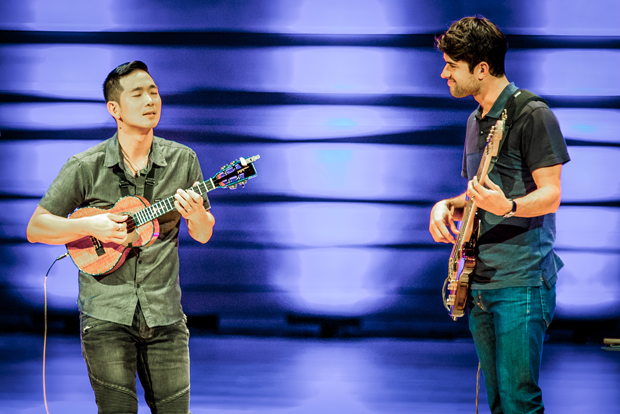
Playing an astonishingly sensitive, yet ballsy version of fellow uke player George Harrison’s ‘While My Guitar Gently Weeps’, that clip, posted by someone else unknown to him, has received almost 15 million views to date. In Montreal’s acoustically superb symphonic hall, Shimabukuro offered another of his favorite party pieces – he’s also revamped my namesake’s ‘Thriller,’ Daft Punk’s ‘Get Lucky’, Adele’s ‘Rolling in the Deep’ and Leonard Cohen’s ‘Hallelujah’ – Queen’s ‘Bohemian Rhapsody’. Mixing precise fingerpicking and thumb work with tapping harmonics and rapid and percussive, flamenco-like strumming, Shimabukuro is the John McLaughlin of the ukulele, making his modest instrument variously ring like a sitar, harp or kora. Alongside electric bassist Nolan Verner, who provided welcome bottom end to the toppy timbre of the uke, Shimabukuro then rendered ‘Ichigo Ichie’ (‘Once in a Lifetime Chance’ in Japanese), a molasses slow ballad that melded classical and folk sensibilities.
The central diva at this year’s fest was ‘call me Ms.’ Lauryn Hill, who had frustrated at least one Mexican fan by not appearing onstage until 10pm for a 7.30pm show (notwithstanding opener bluesy soulster Jalen N’gonda from Liverpool). According to the fan in question, who accosted me in the street to voice his complaints, the show was too loud and disorganised, a comment refuted by a band member I met in the Hyatt elevator who countered, ‘Clearly, he missed the joy.’ Certainly the Hill show was quite a spectacle, on the second night, after a protracted set by a reggae DJ, the pint-sized Hill, energies aligned, arrived to a surge of applause, the audience on their feet, her large band with full brass section and trio of backing singers stoically at the ready.
By that hour however I was called to my final indoor concert of the evening at Gesu – a tribute to the late Montreal pianist Paul Bley, who I’d been lucky to hear in person some years earlier at the festival in duo with Lee Konitz. Stellar compatriot pianists Francois Bourassa and Marianne Trudel honoured Bley with textural off the cuff exchanges from yin and yang positioned grands. Though the inevitably competitive nature of such a format made for more garrulous displays from each pianist than what was typical of the somewhat skeletal, elliptical Bley, the two performed with superb simpatico and on Bley’s ex-wife Annette Peacock’s sparse, trippy ‘Nothing Ever Was Anyway’ – first recorded by Bley in 1968 – it was a different story. While Trudel hammered inside her piano with little rubber mallets, Bourassa dampened the strings inside his and the pursuant playing from each protagonist was limpid, sombre, ominous. Commemorating Ornette Coleman’s 1958 sideman date in Bley’s quintet at the Hillcrest Club, the duo finished with Coleman’s rambunctious ‘Free’ from that date (subsequently recorded on Coleman’s Change of the Century the following year). The two piano’s echoed Coleman and Don Cherry’s cliff edge recitation of the stuttery head to ‘Free’ and each exchanged gripping solos over respectively creative comping.
Another iconoclastic Coleman, Steve, ruled the roost at Monument-National, playing a rigorous, continuous set for almost two hours with his group Five Elements: long-term member trumpeter Jonathan Finlayson, newbie guitarist Miles Okazaki and UK bassist Anthony Tidd and impressive drummer Sean Rickman who were in the group 15 years ago on Resistance is Futile (Label Bleu). Coleman’s crew began with a Cuban-flavored descending groove that hinted at tico tico. Comme d’habitude, the leader remained tightly in control of proceedings slowing perennially offbeat riffs with his alto, injecting sly but short idea cells then doubling the time. Five Elements is a well-oiled mechanism, that drives on tension: one false move could blow a gasket. However improvised the motifs Coleman commences with (his compositions are often transcribed improvisations built into structures for longer exposition), there have to be coded trigger phrases to enact the metrical shifts that drew applause from the entranced audience. At the end of one extended vamp Finlayson ended ever-so-slighty off and Coleman laughed as if embarrassed. Given his predilection for interpolating Charlie Parker quotes and fragments of archaic standards – did I hear ‘I’ve Found a New Baby?’ – you could be forgiven for thinking Coleman’s concept is all arch conundrum, whereby he keeps his band in a state of nervous obeisance while he tuck points the irregular shards of a complex improvised mosaic.
Coleman is much more playful live than in the studio, you don’t hear any of these blatant references to the jazz canon on Functional Arrhythmias (Pi Recordings 2013), his most recent studio date with this incarnation, a group concept he pioneered in 1981. He maintains he was inspired by percussionist Milford Graves to explore heart sounds and rhythms and other physiognomical, frequently asymmetrical, normalities and anomalies. Hence such titles as ‘Irregular Heartbeats’, ‘Cardiovascular’ and ‘Lymph Swag (Dance of the Leukocytes)’ on Functional Arrhythmias. It may be one of his most convincing extra curricular conceits to date, extending to his larger project with the Council of Balance, Synovial Joints, where he “analysed the movement of the various synovial joints of the human body, how they pivot, flex and bend, contract and relax and applied those features so that the music flows not just in a linear fashion, but with cyclical spin or rotation.”
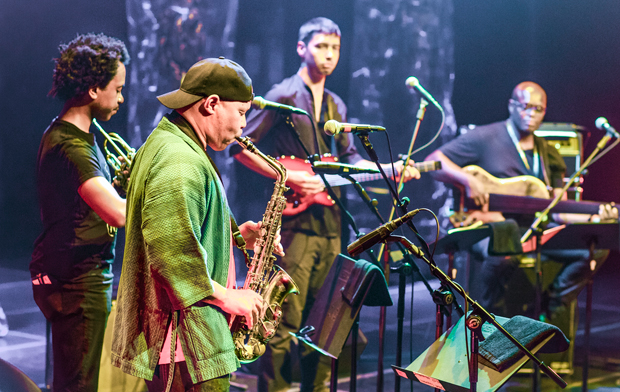
As demanding as Coleman’s music is to listen to, let alone participate in, he does make concessions, despite never announcing the material. One of the lengthy sorties at Monument-National clearly evoked a Cubist take on ‘Round Midnight’, a vehicle he has toyed with wryly over the years, Coleman hopping in and out of a latticed rhythmic nest like a nimble cuckoo. Also his flame for the Bunky Green ballad ‘Little Girl I’ll Miss You’ has never dimmed; he played it, diced with a sushi knife of course, with stunning passion that belied his otherwise ascetic aesthetic. Another influence that, laughably, I never detected in MBASE lore before are the elusive beats and austere stance of fellow Chicagoan Henry Threadgill.
There were very few walkouts, if any, in a large packed house for such a marathon set of, to those unsold, enervating soundscapes and encores were demanded. For the last, Five Elements won a standing ovation when Coleman, as he is wont, made the band stash their axes and scat.
For those who disavow the Montreal Jazz Festival for its often populist programming, there was more beyond the mainstream music to be heard at Gesu with the duo of trumpet sage Wadada Leo Smith and fiercely curious pianist Vijay Iyer (who was a member of Smith’s Golden Quartet between 2005 and 2010). As with the Coleman set there were moments when the music could naturally have reached denouement then insisted on connecting further ideas, but this duo is one of Smith’s more successful and sympathetic, and the sombre lighting and hushed attentiveness of the basement venue heightened expectation. Smith’s dramatic, unhurried ascending lines, unapologetic cracked entries and stark attack, plus his predilection for harmon mute, most obviously recall Miles Davis but his entirely unsugared approach is unlike anyone else. The resourceful Iyer knows well how to counter Smith’s sustained bleak streaks with his own line of brevity, understatement and supporting textures. Iyer began on Fender Rhodes and returned to it, also deploying a small keypad and processor on the piano proper to create high-end morse-like taps and center-of-the-earth laval drones. Daubs and sprinkles alternated with schizoid hammering and Cecil Taylor-like intensities as Smith would klaxon or half-valve squish. The settings reflected the collaboration the two made on ECM’s A Cosmic Rhythm With Each Stroke (2016), which featured a suite inspired by the visual art and evocative diary entries of Nasreen Mohamedi (1937-1990), which hold especial resonance for Iyer. Motifs from Smith’s homage to heroic contralto Marian Anderson (the first black woman to sing at the Met among other civil rights breakthroughs), were discernible in the unannounced set, lots of extra long, strong sustains from the trumpeter which correlate with the unembellished purity and spiritual resonance of the great woman herself.
Earlier that day Smith had been invited to participate in a Dialogic Workshop at the behest of professor-at-large Dr Norman Cornett at the church of St John the Evangelist in Montreal. Cornett, a very intense, passionate man has been hosting these unique symposiums for 20 years, previously inviting such as David Murray, Oliver Jones, Branford Marsalis, Stanley Cowell, Tord Gustavsen, Marianne Trudel and also Bley and Iyer to discuss the creative process with a bent toward the philosophical/spiritual.
As well as being incredibly generous with his time, the substantial research behind Smith’s compositional strategies and his sagacious command of the right, never completely illusive, language to describe and respond to questions about his process led to a gripping conversation which touched upon Scott Joplin, Baby Dodds, Harvard Law professor Charles Ogletree Jnr, Marxist Black Panther affiliate and author Angela Davis, Lyndon Johnson, Bob Marley, Mahalia Jackson – even the gravity of Jupiter.
Unidentified blindfolded listeners had submitted categorised responses to tracks from A Cosmic Rhythm With Each Stroke which Cornett ran down. In his words, “the dialogic jazz workshops constitute an endeavor in what I term ‘community education’ whereby the public, i.e. ordinary people may engage in person with the foremost jazz musicians… to demythologize jazz for the average individual.” At least three people ended up in tears due to the intensity of the discussion, including the beneficent Smith himself.
Though his music also commands careful attention, listening to pianist Fred Hersch was like soothing the soul in a lavender and frankincense salt bath after the acute tenacity of Coleman and Iyer/Smith. Like each of the latter, Hersch is a genius, yes folks, you heard it here and we don’t bandy the term about, but what really beguiles is the Cincinnati born pianist’s ability to weave a through story. Like Bobby Wellins or Keith Jarrett, he can hold your attention with an original long-form narrative that could wind forever and continue to blossom. Those who sleep on Hersch may not approve of his classicised technique, his dry persona or his lack of ostensible flash, but they are also sleeping on two hands that share an unique antiphony with each other, or rather each tells a distinct story simultaneously. I could enjoy Hersch, especially solo as on this occasion, past my tiring threshold with many a lesser pianist and am reluctant to laundry-list his set-list; it all felt quite sublime.
Other pleasures in brief included Marcus Miller’s Afrodeezia group featuring Alex Hann and Russell Gunn funking it up on ‘Papa Was a Rollin’ Stone’, Miller’s favorite bass line; Chilean saxist Melissa Aldana slap tonguing in cahoots with drummer Jochen Rueckert’s snare and killing an a cappella ‘Nearness of You’ with Sonny Rollins-like drive and her own trademark bent notes and trills; the Cuban power fusion combo of Volcan Trio – Gonzalo Rubalcaba, ‘El Negro’ Hernandez and electric bassist Armando Gola playfully tearing up ‘Salt Peanuts’.
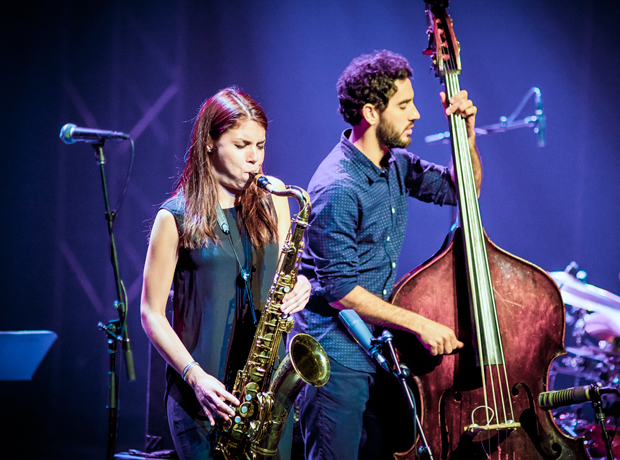
Perhaps the biggest charmer – notwithstanding the efforts of Cullum, Smith and 81-years-young Oliver Jones, who, though determined to retire, opened his farewell set with a romp through mentor Oscar Peterson’s ‘Cakewalk’ as if it was erm, a cakewalk – was the one-off Ala.Ni. Brought back after an auspicious festival debut at L’Astral last year, the young Brit’s fragile voice – a mélange of Madeleine Peyroux, Edith Piaf and in it’s most intimate moments, Elvis – revealed itself to be much stronger than appeared at first blush when she capriciously strolled offstage into the crowd howling the melismatic, lovelorn refrain to her ‘Darkness at Noon’. When a heckler from the balcony earlier called out ‘inaudible!’, she had drolly mimed the rest of the lyrics into her vintage mic. In spite of her sophistiqué chanteuse stance and the throwback deportment of her original repertoire, she’d drop the occasional f-bomb and slipped out of character to introduce ‘Ol’ Fashioned Kiss’ as ‘a song about snogging’. Gathering her knees precariously atop her tall stool at one point, betwixt bandmates playing harp and guitar, you weren’t quite sure what this former theatre studies student might do next. A beautiful subject to photograph with her gangly arms circumscribing ‘the circle that’s never the same’ (a recurrent phrase in one of her most enigmatic songs), this photographer sadly has no shots of Ala.Ni to serve as proof of the pudding. Some reprobate stole his camera and made off with the images he shot at Soda that night: Bastard!
So in the possible case Ala.Ni doesn’t become a big star very soon (she defies easy classification), you’ll just have to take my word for it.
– Michael Jackson (Story and photos)